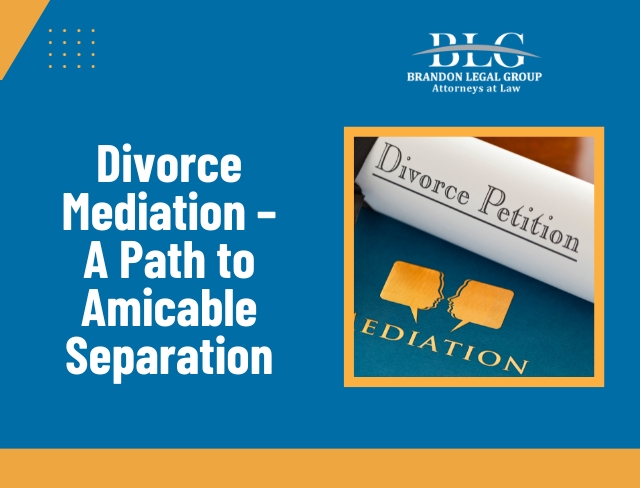Divorce is never easy. It’s a journey filled with emotional and financial complexities. But what if there was a way to ease these burdens? This is where divorce mediation comes into play, offering a smoother path through this challenging time.
What is Divorce Mediation?
Divorce mediation is a process where a neutral third party, known as a mediator, helps couples negotiate and reach agreements on various aspects of their divorce. Unlike traditional divorce proceedings, mediation is often more cost-effective and less confrontational, focusing on collaboration and mutual respect.
The Role of a Divorce Mediator
A divorce mediator is not a judge but a facilitator who assists couples in finding common ground. Their goal is to guide discussions, helping spouses collaboratively work through issues and reach an agreement that suits both parties.
Benefits of Choosing Mediation
Mediation presents several advantages over going to court:
- Emotional Well-being: It’s less adversarial, reducing stress and emotional strain.
- Financial Savings: Mediation is typically more cost-effective than a court trial.
- Confidentiality and Control: Couples have more control over the outcome, and proceedings are private.
How Mediation Aids in Complex Situations
Mediation can be particularly effective in complex divorce scenarios, such as disputes over child custody or asset division. It encourages open communication and creative problem-solving, leading to more satisfactory outcomes for both parties.
Preparing for Your Mediation Session
Preparation is key in mediation. Gather necessary documentation, like financial statements, and come with a clear but flexible mindset. Understand your priorities but be ready to compromise.
Understanding the Mediation Process
Divorce mediation is a collaborative approach that allows couples to resolve their disputes amicably, with the guidance of a trained mediator. Understanding this process can greatly reduce anxiety and help both parties approach their sessions with more clarity and confidence.
1. Initial Consultation: The mediation process typically begins with an initial consultation. Here, the mediator meets with both parties to discuss the goals and ground rules for the mediation. This session sets the tone for open communication and mutual respect throughout the process.
2. Gathering Information: Both parties are asked to gather and share relevant information, such as financial documents, property records, and details about childcare arrangements. This phase is crucial for ensuring that all decisions are made based on accurate and complete information.
3. Identifying Issues: The mediator helps the couple identify and prioritize the issues that need to be resolved. These can range from division of assets and debts to parenting plans and spousal support. By clearly defining these issues, the mediator sets a roadmap for the sessions ahead.
4. Exploring Options: One of the key strengths of mediation is its flexibility. The mediator encourages both parties to think creatively and propose solutions. This collaborative problem-solving approach often leads to more satisfying and mutually beneficial outcomes.
5. Negotiation and Compromise: Mediation is about finding a middle ground. The mediator facilitates discussions, helping each party understand the other’s perspective and guiding them toward compromise. The goal is to reach agreements that are fair and workable for both parties.
6. Drafting the Agreement: Once all issues are resolved, the mediator drafts an agreement reflecting the decisions made. This document is then reviewed by both parties (and their attorneys, if involved) to ensure accuracy and fairness.
7. Finalizing the Agreement: The final step is the formalization of the agreement. Once both parties sign, the agreement is submitted to the court for approval, making it legally binding.
Throughout this process, the mediator acts as a neutral facilitator, ensuring that discussions stay productive and focused. It’s important to note that mediators do not provide legal advice. For legal guidance, parties are encouraged to consult with their individual attorneys.
Knowing how mediation works can make going through a divorce feel less stressful. It lets people play a key part in planning their life after divorce. This makes mediation a good option for those who want a less confrontational and more manageable way to end their marriage.
Role of an Attorney in Mediation
Having a divorce attorney by your side during mediation can be invaluable. They offer legal guidance, ensure your rights are protected, and help articulate your interests clearly.
Why Choose Us for Your Divorce Mediation
At our law firm, we specialize in guiding clients through the mediation process with skill and empathy. Our experienced mediators are committed to finding the best possible outcomes for our clients.
The following is a DRAMATIZATION AND IS NOT AN ACTUAL EVENT: Take the case of Sarah and Tom. They approached us for mediation after realizing that a court battle would only exacerbate their stress and financial strain. Through mediation, they amicably agreed on child custody and asset division, preserving a respectful relationship for future co-parenting.
FAQs
1. What issues can be resolved through mediation?
Nearly all divorce-related issues, including child custody, spousal support, and asset division, can be resolved through mediation.
2. Is a mediated agreement legally binding?
Yes, once it’s formalized into a legal document and approved by a court, a mediated agreement becomes legally binding.
3. How long does mediation typically take?
The duration varies, but mediation is generally quicker than going to court.
4. Can I still go to court if mediation doesn’t work?
Yes, you have the right to go to court if mediation fails to resolve your issues.
Conclusion
Divorce mediation offers a path of respect and collaboration, allowing couples to navigate their separation with dignity. Our law firm is dedicated to supporting you through this process, ensuring your voice is heard and your rights are protected. If you’re facing the prospect of divorce and seeking a less adversarial approach, we invite you to contact us. Let’s work together to find a peaceful resolution.
